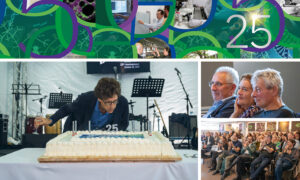
Beyond COMPARE
The COMPARE project has launched with over €20 million in funding from the EU to speed up the detection of and response to infectious disease outbreaks using pathogen genome sequencing and infection-control data. The aim of the project is to reduce the impact of disease outbreaks among humans and animals worldwide.

- COMPARE project receives over €20 million in funding from EU to speed up the detection of and response to infectious disease outbreaks using genome technology.
- EMBL-EBI partners to provide the compute and data-sharing infrastructure to support rapid sharing and analyses of incoming data from the consortium and beyond.
- Ultimate goal is to reduce the public-health, patient-specific and economic impacts of epidemics and outbreaks.
Infections such as the current epidemic of Ebola virus and the rise in antibiotic resistant bacterial infections are causing global health concerns. In addition to the humanitarian consequences, human and animal infectious disease epidemics have a detrimental effect on economies, global trade and food security. The longer it takes from the start of an outbreak until it is detected and controlled, the greater the societal and economic impact. The quicker the disease-causing microorganisms are detected the faster infection control and therapeutic strategies can be deployed.
Using pathogen genome sequencing allows the rapid assessment of pathogenic potential, drug resistance and molecular epidemiology.
Using pathogen genome sequencing allows the rapid assessment of pathogenic potential, drug resistance and molecular epidemiology. COMPARE will create a user-friendly platform for quickly sharing these datasets so they may be accessed easily by healthcare, risk-assessment and research professionals.
“The platform we are going to create in this project will make it possible in real time to exchange and interpret information about disease-causing microorganisms from around the world and to compare this with other relevant information such as clinical and epidemiological data,” says Frank Møller Aarestrup of the National Food Institute, Technical University of Denmark. “The aim is that the platform can be used to harmonise the way scientists, authorities, doctors and organisations around the world collect samples, generate genome sequencing data and carry out risk assessments. This new approach to disease surveillance will be able to revolutionize the way we combat diseases globally.”
EMBL-EBI partners will provide the compute and data-sharing infrastructure to operate COMPARE. Based on the European Nucleotide Archive (ENA) and the Embassy Cloud, COMPARE will support rapid sharing and analyses of incoming data from the consortium and beyond.
Guy Cochrane, Team Leader of the ENA at EMBL-EBI says, “We’ve built up a lot of experience and technology in collecting, organising and making available genomic data. Bringing this to the table, COMPARE will see us building faster tools to reach decision points within appropriate timeframes for intervention in outbreak scenarios. We will also provide interfaces appropriate for the research community and the whole of the public health profession.”
One of the project’s deliverables is a suite of tools that can be used to diagnose and treat patients, investigate outbreaks and communicate the risks associated with various disease-causing microorganisms.
Paul Kellam of the Wellcome Trust Sanger Institute, a leader in sequencing pathogen genomes and the clinical application of the resulting data, says, “The dramatic change in the speed and scale of producing pathogen genomes and linking these data to specific epidemiological and clinical metadata now offers a real chance to change the course of infections. We are currently producing large datasets from various national and international collaborations with open data access to the genomes. As pathogens don’t respect national borders the real power of these data comes when we can share and combine it, and this is what COMPARE will achieve.”
About COMPARE
COMPARE is a collaboration between 29 partners throughout the world, which makes it easier for the project to address diseases that can spread from animals and food to humans. Participants include members of the Global Microbial Identifier project to improve global disease surveillance and clinical diagnosis of diseases, as well as many of Europe’s leading institutions in the field of emerging epidemics and foodborne outbreaks. COMPARE is led by Frank Møller Aarestrup of the National Food Institute, Technical University of Denmark.
This post was originally published on EMBL-EBI News.


